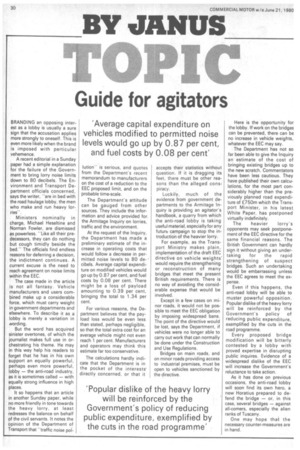Guide for agitators
Page 32

If you've noticed an error in this article please click here to report it so we can fix it.
BRANDING an opposing interest as a lobby is usually a sure sign that the accusation applies more strongly to oneself. This is even more likely when the brand is imposed with particular vehemence.
A recent editorial in a Sunday paper had a simple explanation for the failure of the Government to bring lorry noise limits
down to 80 decibels. The Environment and Transport Department officials concerned, says the writer, "are in bed with the road haulage lobby, the men who make and run heavy lorries-.
Ministers nominally in charge, Michael Hese'tine and Norman Fowler, are dismissed as powerless. "Like all their predecessors, they can do nothing but cough timidly beside the bed." The officials find endless reasons for deferring a decision, the indictment continues. A current excuse is the need to reach agreement on noise limits within the EEC.
The case made in the article is not all fantasy. Vehicle manufacturers and users combined make up a considerable force, which must carry weight in government departments and elsewhere. To describe it as a lobby is merely a variation in wording.
But the word has acquired sinister overtones, of which the journalist makes full use in orchestrating his theme. He may in this way help his readers to forget that he has in his own support an equally powerful, perhaps even more powerful, lobby — the anti-road industry, as it is sometimes called — with equally strong influence in high places.
It so happens that an article in another Sunday paper, while no more friendly in tone towards the heavy lorry, at least redresses the balance on behalf of the civil servants. It notes the opinion of the Department of Transport that "traffic noise pot lution" is serious, and quotes from the Department's recent memorandum to manufacturers on the cost of a reduction to the EEC proposed limit, and on the probable time-scale.
The Department's attitude can be gauged from other sources. They include the information and advice provided for. the Armitage Inquiry on lorries, traffic and the environment.
At the request of the Inquiry, the Department has made a preliminary estimate of the increase in operating costs that would follow a decrease in permitted noise levels to 80 decibels. Average capital expenditure on modified vehicles would go up by 0.87 per cent, and fuel costs by 0.08 per cent. There might be a loss of payload amounting to 0.39 per cent, bringing the total to 1.34 per cent.
For various reasons, the Department believes that the payload loss would be even less than stated, perhaps negligible, so that the total extra cost for an average vehicle might not even reach 1 per cent. Manufacturers and operators may think this estimate far too conservative.
The calculations hardly indicate that the Department is in the pocket of the interests' directly concerned, or that it accepts their statistics without question. If it is dragging its feet, there must be other reasons than the alleged cons-: piracy.
Luckily, much of the evidence from government departments to the Armitage Inquiry is providing an agitator's handbook, a quarry from which the anti-road lobby is taking useful material, especially for any future campaign to stop the introduction of the heavier lorry.
For example, as the Transport Ministry makes plain, implementation of the draft EEC directive on vehicle weights' would require the strengthening or reconstruction of many bridges that meet the present British requirements. There is no way of avoiding the considerable expense that would be involved.
Except in a few cases on minor roads, it would not be possible to meet the EEC obligation by imposing widespread bans. The point of the directive would be lost, says the Department, if vehicles were no longer able to carry out work that can normally be done under the Construction and Use Regulations.
Bridges on main roads, and on minor roads providing access to industrial premises, must be open to vehicles sanctioned by the directive. Here is the opportunity for the lobby. If work on the bridges can be prevented, there can be no increase in vehicle weights, whatever the EEC may say.
The Department has not so far been able to give the Inquiry an estimate of the cost of bringing existing bridges up to the new scratch. Commentators have been less cautious. They have published their own calculations, for the most part con siderably higher than the previously planned road expenditure of £750m which the Transport Minister, in his latest White Paper, has postponed virtually indefinitely.
The heavier lorry's opponents may seek postponement of the EEC directive for the same financial reasons. The British Government can hardly sign it without giving an under taking for the rapid strengthening of suspect bridges. Such an undertaking would be embarrassing unless the EEC agrees to meet the expense.
Even if this happens, the anti-road lobby will be able to muster powerful opposition. Popular dislike of the heavy lorry will be reinforced by the Government's policy of reducing public expenditure, exemplified by the cuts in the road programme.
Every proposed bridge modification will be bitterly contested by a lobby with proved expertise in disrupting public inquires. Evidence of a widespread dislike of the EEC will increase the Government's reluctance to take action.
As it has done on previous occasions, the anti-road lobby will soon find its own hero, a new Horatius prepared to defend the bridge — or, in this case, several bridges — against all-corners, especially the alien ranks of Tuscany.
One may hope that the necessary counter-measures are in hand.




























































































































